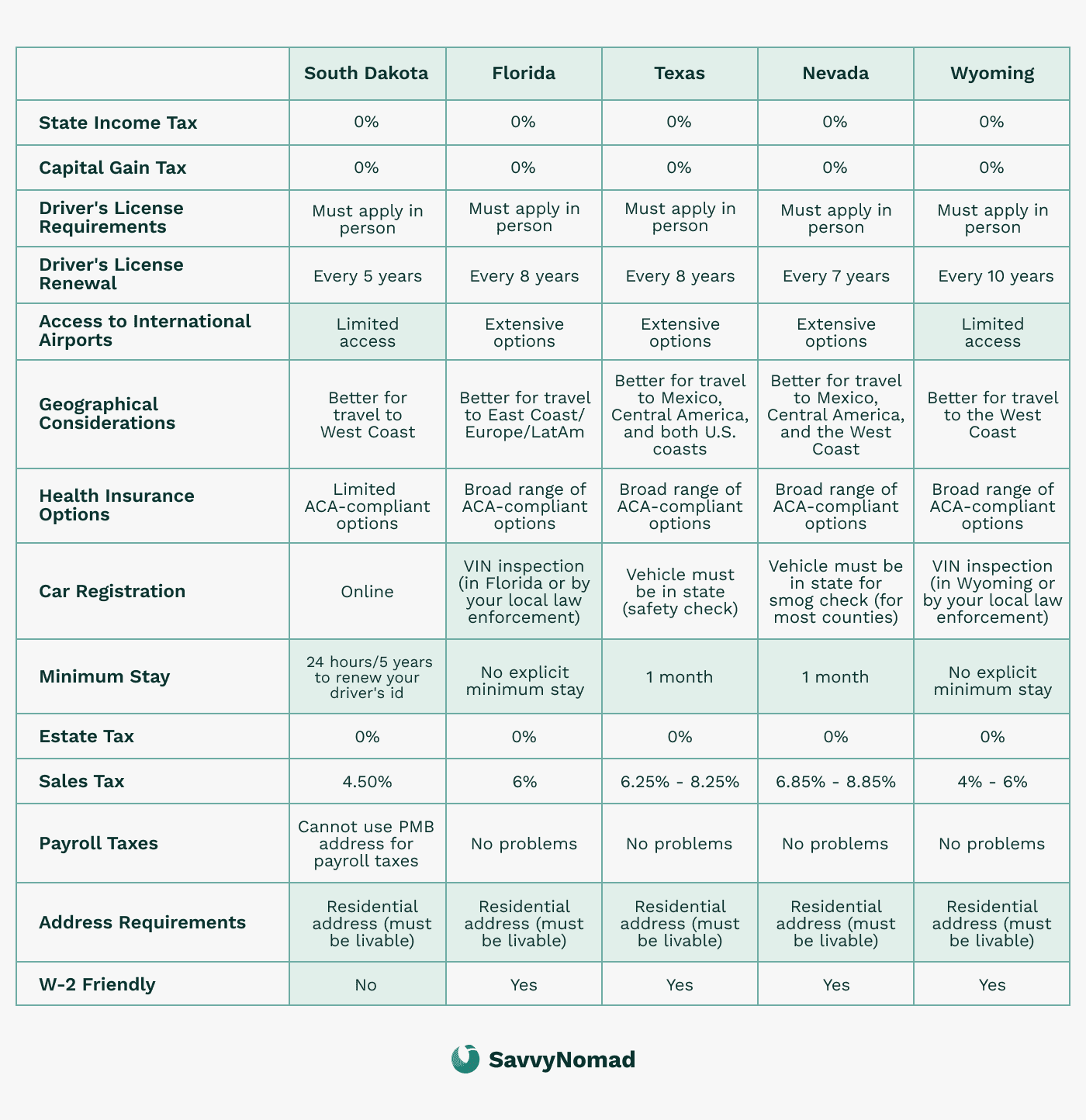How to leave Arizona residency?

Thinking of leaving Arizona for lower taxes or a new job?
You'll need to take specific steps to officially cut ties with Arizona for tax purposes.
Whether you’re moving for a job, retirement, or a fresh start, following these steps can help make your transition smoother and reduce the risk of unexpected tax issues with Arizona.
Step 1: Establish a new domicile
The first and most important step when leaving Arizona residency is to establish a new permanent home, or domicile, in another state. This means more than just physically moving—it’s about making sure all the evidence points to your new state being your permanent residence.
Here’s how to do it:
1) Establish new residency
- Secure a residential address: Find a place to live in your new state, whether it’s through renting or buying a home. Many states, like Florida, offer tax benefits such as the homestead exemption, which could help lower your property taxes. Setting up a permanent residence in your new state is essential to proving that you’ve left Arizona.
Acceptance always depends on each institution’s own policies, and the service itself does not provide tax, legal, or investment advice.
- File a Declaration of Domicile: Some states, like Florida, allow you to file an official document called a Declaration of Domicile to confirm your intention to make that state your permanent home.
Residency guides:

2) Relocate your belongings
Moving personal items like your furniture, vehicles, and other household possessions to your new state shows that you are serious about making it your permanent home.
3) Spend time in your new state
Spend as much time as possible in your new state to make it clear that you’ve established permanent residency there. If you continue spending a lot of time in Arizona, it could make your residency status unclear for tax purposes.
4) Transfer IDs and vehicle registrations
Update your driver’s license and vehicle registration with your new state’s Department of Motor Vehicles (DMV). This is a clear sign of your intent to make the new state your permanent home.
5) Register to vote (if eligible)
If you are eligible to vote in your new state, you may update your voter registration there and follow the official process to cancel your Arizona registration. Registration and voting in your new state can be a supporting indicator of domicile, but it is not determinative on its own. For questions about where you are legally allowed to register and vote, rely on guidance from state and local election officials.
6) Update financial accounts
Notify your bank, credit card companies, and other financial institutions of your new address. Keeping all your financial documents up to date with your new residency helps confirm your move.
7) Notify your employer
Make sure your employer updates your payroll and tax withholdings to reflect your new state of residence. This prevents Arizona from withholding state income taxes from your paycheck after your move.

Step 2: Sever ties with Arizona
Once you’ve established a new domicile in another state, it’s time to cut your official ties with Arizona to reduce the chances that you will be treated as a resident for tax purposes and to strengthen your position if your status is ever reviewed.
Here’s how you can sever your ties:
1) Close Arizona financial ties
- Close local bank accounts: If you have any bank accounts or financial assets based in Arizona, consider closing them or transferring the funds to banks in your new state. This shows that your financial life is now centered in your new state, not Arizona.
- Update personal records: Update your address with the IRS, Social Security, and any other relevant entities. Keeping all personal and financial records in your new state helps solidify your move.
2) Sell or lease property
If you own a home or other property in Arizona, selling it is one of the clearest signals that you no longer reside in the state. If you choose to lease your property instead, consider a long-term lease to demonstrate that you don’t maintain a residence in Arizona.
3) Cancel local subscriptions/services
Make sure to cancel any memberships, utilities, or subscriptions tied to Arizona, such as gym memberships, utility services, or local organizations. Keeping these active could give the impression that you still maintain a presence in the state.
4) Transfer healthcare and insurance
Move your healthcare services and providers to your new state. Transferring these essential services further strengthens your case that your daily life is now based elsewhere.

Step 3: Time spent outside Arizona
Once you’ve established your new residency and severed ties with Arizona, it’s important to manage the time you spend in the state. Arizona looks at both your domicile (your permanent home) and your physical presence when deciding whether you are a resident for tax purposes.
Spending more than nine months in Arizona during a tax year creates a presumption that you are a resident, even if you say you live elsewhere.
Nine-month presence presumption
- What is the nine-month rule?: Under Arizona law and guidance, if you spend more than nine months of the taxable year in Arizona, you are generally presumed to be a resident for tax purposes, even if you have ties to another state. This presumption can sometimes be overcome with strong evidence that your presence was only temporary or transitory, but it shifts the burden of proof onto you.
- Why days alone are not enough: Being in Arizona for fewer than nine months does not automatically make you a nonresident if Arizona is still your domicile. If your permanent home, family, or main economic interests remain in Arizona, the state can still treat you as a resident even under that threshold.
- Practical target: As a practical rule of thumb, many people who are trying to leave Arizona residency aim to spend less than nine months in the state and to show that their main home and life are now clearly in another state. That combination makes a nonresident position easier to defend if Arizona ever reviews your situation.
Keep detailed travel records
- What to track: Save flight tickets, hotel receipts, toll records, and any other travel documents that show when you entered and left Arizona. Having a detailed log of your movements will be helpful if your residency status is ever reviewed by Arizona’s Department of Revenue.
- Why it’s important: If your residency status is ever questioned, having detailed records of your time spent in and out of Arizona will be essential for showing how much time you actually spent in the state and supporting your claim that your main home is elsewhere.
Step 4: Arizona-sourced income
Even after you’ve officially left Arizona residency, you may still have tax obligations if you earn income from Arizona-based sources.
Here’s how to handle Arizona-sourced income after your move:
1) Ongoing tax responsibilities
- File non-resident tax returns: If you continue to earn income from Arizona sources, such as rental properties or business profits, you will need to file a non-resident tax return in Arizona. This allows the state to tax only the income you earned in Arizona, not income earned in your new state of residence.
- Tax on Arizona-sourced income: Even though you are no longer a resident, Arizona still has the right to tax income generated within the state. This could include wages earned in Arizona, rental income, or profits from Arizona-based businesses.
2) Rental or business income
If you own rental property or a business in Arizona, any income generated from those sources will still be subject to Arizona state taxes. It’s important to consult with a tax professional to ensure compliance with Arizona tax laws, especially if you have complex income streams that tie back to the state.





